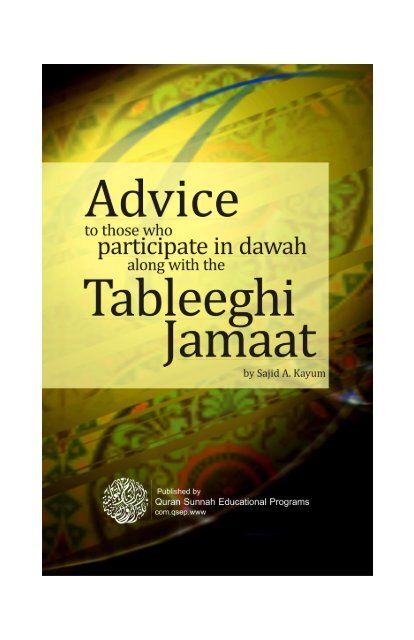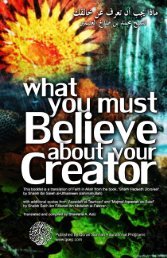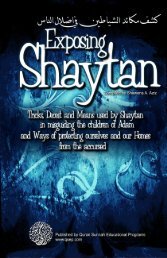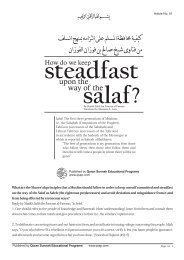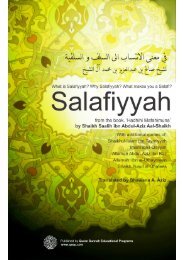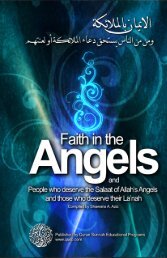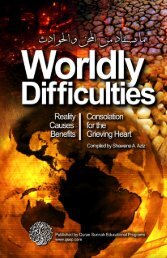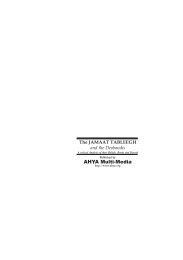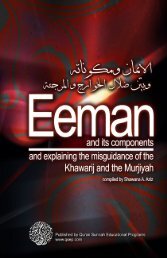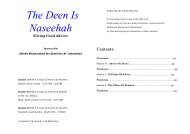Create successful ePaper yourself
Turn your PDF publications into a flip-book with our unique Google optimized e-Paper software.
Adviceto those whoparticipate in dawahalong with theTableeghiJamaatby Sajid A. KayumPublished byQuran Sunnah Educational Programswww.qsep.com
IndexKnowledge is necessary to fulfill the responsibility of Dawah..............................01Advice to those who participate in Dawah along with the Tableeghi Jamaat........05Methodology of the Discussion..............................................................................06Experiences from 2001 to 2011.................................................................................13Tableeghi Jamaat and its relation to Deoband and Sufism.....................................16The Tableeghi Jamaat is a Deobandi group....................................................17Important Personalities amongst the Deobandis and the Tableeghi Jamaat..18The Tableeghi Jamaat’s Handbook.................................................................21The Definition and Reality of Sufism..............................................................22Attachment to graves is persistently endorsed in stories of Fazaail-e-Aamaal......25Stories of calling upon the Messenger of Allah...............................................26Should such stories be circulated amongst common Muslims ?.....................29An Important Additional Clarification....................................................................31Moulana Zakariyyah did not invent these stories,and these can be found in books from the pastThe Prophet severely warned against taking graves as places of worship even onhis death-bed !...........................................................................................................34Undue veneration of the graves in the stories of Fazaail-e-AamaalStory endorsing that Dua (supplication) is more acceptable near graves........40Asking the Prophet for Shafa'ah after his death is endorsed in the stories ofFazaail-e-Aamaal....................................................................................................42Fazaail-e-Aamaal contains stories of complaining at graves, and the deadperforming righteous actions that benefit the living !!..........................................48The unanimous Aqeedah of the Deobandis and their approval of benefitting fromthe graves.................................................................................................................50Conclusion...............................................................................................................52Appendix:The reality of unusual events near graves and tombs............................53
Knowledgeis necessary to fulfillthe responsibility of DawahDawah to Allah is indeed a lofty deed which leads to greatbenefit for the Muslim Ummah. Its purpose is to rectify thereligious and worldly affairs of the people, so that their lives arein accordance with the guidance that has been revealed by Allah.Dawah is an endeavor and a means to great reward andhonor, as the Messenger of Allah said to Alee ibn Abi Talib on the day of Khaybar, “By Allah!If a single person embracesIslam at your hands - that will be better for you than redcamels.”[Saheeh al-Bukharee (52/192)]However, to be entitled to this reward, it is essential that the onewho calls people to righteousness should have the correctunderstanding of what he is calling to - though he does nothave to know the entire religion - as Allah Messenger said,“Convey from me, even if it is one verse.”[Saheeh al-Bukharee (3461)]Al-Hafidh ibn Hajar (rahimahullah) said explaining the words,“even if it is one verse” - so that everyone who heard him ,would hasten to convey whatever he heard of the verses - even if01
it was very little - so that in this manner, everything that he brought would be conveyed.[See, Fathul-Baree]Shaikh Ibn Uthaimeen (rahimahullah) explained,“If a person understands what he is calling people to,it makes no difference whether he is a great and prominentscholar or a seeker of knowledge who is serious in hispursuit thereof, or a regular person who has certainknowledge of the issue in question.The Messenger said, “Convey from me, even if it isone verse,” and he did not stipulate that the caller to Allahshould reach a high level of knowledge, but it is essentialthat he should have knowledge of that which he is calling thepeople to. But Dawah based on ignorance or emotion is notpermissible.”[Fatawa Ulama al-Balad al-Haraam (p. 329)]“It is also declared Haraam (forbidden) to say or discuss thingsabout which one does not have knowledge, as Allah says,“Say (O Muhammad ), ‘(But) the things that my Lord hasindeed forbidden are al-Fawahish (great evil sins) whethercommitted openly or secretly, sins (of all kinds), unrighteousoppression, joining partners (in worship) with Allah for whichHe has given no authority, and saying things about Allah ofwhich you have no knowledge.’”[Soorah al-A'raaf (7): 33]…and His Saying,“Follow not that of which you have no knowledge.”[Soorah al-Isra (17): 36]There are also other texts (from the Qur'aan and the Sunnah)bearing the same meaning, which encourage the conveyance ofthe Message of Islam and caution against speaking withoutknowledge.”[Permanent Committee Fatawa (qsep 305)]02
Amongst the verses that lay the foundation for the correct mannerof Dawah is Allah’s Order to His Messenger to proclaim,“Say (O Muhammad), ‘This is my way. I invite unto Allahwith sure knowledge, I and whosoever follows me (also mustinvite others to Allah).’” [Soorah Yoosuf (12): 108]Imaam Ibn Katheer (rahimahullah) writes,“(In this verse), Allah orders His Messenger to say tomankind and the Jinn that this is his way - meaning hismethod, path and Sunnah; focused upon calling to thetestimony, ‘there is no deity worthy of worship except Allahalone, (the One) without partners.’The Messenger calls to this testimony with sureknowledge, certainty and firm evidence. He calls to thisway, and those who follow him call to what Allah'sMessenger called to - with sure knowledge, certainty andevidence, whether logical or religious evidence.”[Tafseer Ibn Katheer]“Knowledge is what Allah says in His Book, or what HisMessenger says in his Saheeh (authentic) Sunnah.So one should learn the Qur’aan and the Sunnah to findout what Allah has enjoined and what Allah has forbidden, and toknow the way in which the Messenger called people to Allahand denounced evil, and the way in which his Companions gave Dawah.One can gain insight into this by studying the books ofHadeeth, and paying attention to the Qur’aan, and studying thewords of the scholars on the subject because they have discussedit in-depth and explained what is obligatory.The one who wants to set himself up as a caller must payattention to this matter to have proper insight into the Book ofAllah and the Sunnah of His Messenger - so that he placesthings in their right places.03
He will (thus,) call people to good when it is appropriate, andenjoin what is good when it is appropriate, with insight andknowledge, (And) that he will not denounce evil in a way that ismore evil than it, and that he will not enjoin what is good in amanner that will result in an evil worse than not doing the goodthing.The point is that it is essential for the caller to Allah to haveknowledge so that he does things properly.”[Majmoo Fatawa Ibn Baaz (27/340)]Therefore, while Dawah is essential, and one need not be ascholar to engage in it - if you have taken it upon yourself toinvite others to good, you must have knowledge about it, elsefrom the most evil of matters is:Speaking about Allah without knowledgeEnjoining the good in a manner that will result in agreater evil.04
Advice to those who participatein dawah along with theTableeghi JamaatSo, you have the noble intention to rectify the affairs of thepeople, and have chosen to do this by means of participation inthe activities of the Tableeghi Jamaat - Then here are a fewimportant matters that you should be aware of aboutTableeghi Jamaat’s activities, so that your choice is based onthe right information and the correct perspective. Perhaps, someone exaggerated the status of a group’sactivities; calling it the work of the Sahabah - and itmay not be so. Perhaps, someone exaggerated the reward of doing certainactions - and they may not have any proofs for theirclaim. Perhaps, you are unaware of the gross mistakes in theteachings of a group - and you unknowingly participatein it. Perhaps, you hope that the activities of a group can bringabout religious Islaah (reformation) in the lives of theMuslims - and you have been deceived into believingthis.05
Methodologyof the DiscussionHereunder is a brief history of our discussions with brothersassociated with the Tableeghi Jamaat. It will explain themethodology adopted for the discussions to follow, and serve as aresponse to some commonly raised arguments.This compilation started after we encountered a few tableeghibrothers persistent on recruiting a few friends of ours in theTableeghi Jamaat, while they were already involved in studyingthe Deen and in Dawah - though in a manner different from theTableeghi way.The Tableeghi brothers insisted that the only correct wayof Dawah was their way - as had been handed down by theirelders.We explained to these brothers that our way was to studythe books of Aqeedah, general Fiqh, Tafseer ibn Katheer, etc., -mostly under the supervision of students of knowledge. And wedid do our part in Dawah amongst family, friends and colleaguesbasically by way of exchanging books and tapes, and by generaldiscussions and clarifications.06
When pressed as to why we were averse to joining them, wecited some apparent and observed flaws in the way of theTableeghi Jamaat, among them:There in too much reliance on story-telling in theTableeghi Jamaat, whether it is stories of their buzurgs(elders) or strange occurrences that happen duringTableeghi activities (karguzari).Veteran Jamaat members are seen explaining Islamicconcepts by means of everyday examples (like trains,buses, etc.), instead of Tafseer and Hadeeth.Carelessness in quoting from the Qur’aan and theSunnah are widespread, such that speakers bundle upQur’aan, Hadeeth and stories together, and the listener hasno clue as to what is what.At times, we also find, popular sayings beingpresented as the Hadeeth of Allah’s Messenger .Complete new-comers are encouraged to speak inmatters of the Deen, and they explain Islamic conceptsin light of personal experiences, and often say that whichis either false or inappropriate.No objection is raised to such talk, as long as it iscentered on the basic idea of going out with thetableeghis for three-days, forty-days, etc.This can be quiet frustrating for someone, who isserious in studying the Deen, and is concerned about theauthenticity of what is being said in the name of Allah,the Most High.07
Though the subjects of Islamic learning are varied, theone who associates with this Jamaat hardly makes anyprogress in his knowledge because the education theredoes not go beyond the six-points of tableegh andreadings from Fazaail-e-Aamaal.Members of the Tableeghi Jamaat often imposeparticipation on the people without any considerationfor their schedule or busyness.They greatly exaggerate the virtues of participationwith them and unjustifiably make a person feel guilty forhis lack of involvement.Deception was being used to entice people into the‘three-day routine’; - Veteran tableeghis, who hadalready registered themselves for the activity, wouldcontinually re-register themselves at every mosque to givethe impression that a lot of people are participating, andso the one being called should not be left out.Often we found an exaggerated involvement inTableeghi activities to the extent that individuals wereencroaching upon the rights of their family and neglectingthe upbringing of their children. Many youngsters wereneglecting their education and taking a defeatist attitudetowards life.Though these problems are well-known, our discussion did not headanywhere because our Tableeghi brothers simply denied any suchproblem - although they themselves were prime examples of theseflaws!08
Our next approach was to rely more on textual evidencesinstead of practical apparent problems. We thus, prepared a fewnotes based on Fazaail-e-Aamaal to show that it contains storiesthat contradict Islamic teachings and promote ‘bareilwi-type’superstitions.The idea was that since Fazaail-e-Aamaal is widely readin tableeghi circles, no one would deny the significance of thisbook or its references.We also insisted that when responding to us, the Tableeghibrothers should not make up their own replies - but instead goback to the seniors of their organization, and ask for theirresponse - because what carries weight is the position of theJamaat, and not arguments that someone makes up on the fly.The response of the Tableeghi brothers after consultationwas that Fazaail-e-Aamaal's stories were not directed towardsteaching Aqeedah (beliefs) - but were aimed at encouragingrighteous actions. Hence, they disassociated themselves and theTableeghi Jamaat from the Aqeedah in those stories.You should know that the Aqeedah (creed, beliefs) beingpromoted in the stories of Fazaail-e-Aamaal are well-acceptedstandpoints amongst the Deobandi elders, as we shalldemonstrate during the course of this booklet. But being unawareof this at the time, our argument was…You claim to reach out to those, whom you yourselvesdescribe as ‘not knowing even the kalimah’, and you arewell-aware of them being engrossed in grave-worship andsuperstitions.So, can you honestly say that when these storiesare read out to such ignorant people, that they will onlytake encouragement for righteous action from thesestories, and effectively ignore the false Aqeedah that isendorsed in them?09
Let alone completely ignorant individuals, even long-timers in theJamaat are found upholding these corrupt views, and when askedfor proof, they simply point out at Fazaail-e-Aamaal.For instance, reciting the Kalimah seventy thousand timesto save someone who died, from punishment in the hereafter.This act of worship is based on a story from Fazaail-e-Aamaal,and not from the Sunnah.The discussions ended.Years later, another country, another study circle being persuadedby a group of veteran Tableeghi brothers to join them - The samediscussions started, and headed the same way. And theseTableeghi brothers too, repeated that Fazaail-e-Aamaal and theJamaat only encourage righteous actions, and do not teachAqeedah.This time, however, we were able to show from thebooks of Deobandi elders that the Aqeedah, which Fazaail-e-Aamaal was promoting in those stories, was in fact, agreed-uponbeliefs of the Deobandis.These stories in Fazaail-e-Aamaal were not there bychance or by accident. Rather they were subtly introducing themasses to the beliefs, soofi concepts and attitudes that make upthe Deobandi ideology.The tableeghi brothers responded by saying that their Jamaathad nothing to do with Deoband, rather something called theTableeghi Jamaat did not even exist!!! A few people goingabout their business doing Islaah (rectification) became popularlyknown as Tableeghi Jamaat.This of course, is totally untrue. The ‘Tableeghi Jamaat’is the name of a specific group - with leaders (amirs), centersand activities that involve traveling to pre-decided locations,with a pre-defined syllabus, for fixed days, and with one book- Fazaail-e-Aamaal.10
It was founded by Moulana Ilyas in the 1920s, and has beendirected since by the Deobandis. The members of the group takethe oath of allegiance (bay’ah) to the amir (head) of the Jamaat.These are all signs of an organized group with a specificideology.The brothers backed down from their disassociation with theDeobandis, but since our objections were similar to those onewould usually associate with grave worshipers (like calling uponthe Messenger at his grave, complaining to the engraved andseeking spiritual benefit from the dead, believing that majzoobsare aware of matters between Allah and his slaves, etc.), thebrothers could only assume that these were past views thatare no longer held by the Tableeghi Jamaat or the Deobandis.Many similar discussions with different groups of Tableeghibrothers were to follow, and the same pattern of thoughtlessdenials, making up arguments on the fly, and speaking on mattersof the Deen without knowledge continued.Most of these brothers were neither lying nor intentionallydeceiving. Rather, their carelessness and imprudence was theresult of the tarbeeyah (training) they had received from theTableeghi Jamaat - where all that matters is participation inthe jamaat (organization) activities - be it the 3-day outings,Fazaail-e-Aamaal reading sessions or the Ijtemaas (conferences).The rest did not matter; whether it was correction ofAqeedah, seeking knowledge of the Deen, being sure of what youattribute to the Deen, the consequences of narrating those storiesor dreams, evaluating the exaggerated claims of joining Tableeghigroup’s activities, etc.11
As for us, these discussions chalked out guidelines for ourresearch that we presented as advice to our Tableeghibrothers.The first edition of the book,The Jamaat Tableegh and the Deobandis.A Critical analysis of their Beliefs, Books and Dawahpublished in the year 2001 adhered to the followingmethodology…To base our analysis on textual evidences instead ofevident flaws, and highlight the harms that come fromstories of Fazaail-e-Aamaal.To show that the objectionable ideas are wellestablishedDeobandi views - approved and supported bythe most authoritative Deobandi elders.We also took the added caution of not attributing anypeculiar opinion of an individual Deobandi scholar to bethe position of the Deobandis.To present proofs and quotations from the Englishtranslations of Deobandi books because these books havebeen published after the 1980’s, and thus proving that theDeobandis still adhere to these views, and activelytranslate them for their newer audiences.12
Experiencesfrom 2001-2011The first edition of the book,The Jamaat Tableegh and the DeobandisA Critical analysis of their Beliefs, Books and Dawahsold out within a year, and has been out of print since then. It isavailable online, where it has been downloaded in excess of80,000 times.The first edition was 300 pages, and the second editionwhich is being worked upon is much larger and moreauthoritative - as it has direct quotes and translations from majorscholars of Ahlus-Sunnah.This booklet is a concise version of the first edition, andwe hope to publish the voluminous second edition in the nearfuture, Insha'Allah.A decade has passed since the publication of the first edition, andthis has given us the opportunity to reflect, re-evaluate and furtherresearch our writings.13
We have also received a lot of feedback, support and obviouslyhate-mail; and in them an observed pattern can be seen:Those who are aware of the Deobandi ideology neveraccused us of attributing incorrect views to the Deobandis.Rather they have sought to justify them.The general folk, who affiliate themselves to theDeobandis and actively participate in the TableeghiJamaat out of good intention, are largely unaware of theideology that they are helping spread. And so, they outrightlydeny any connection with those beliefs; ratheraccuse us of making the Tableeghi Jamaat at par with thegrave-worshiping group.And of course, there have been lots of people who havecross-checked our writings and referred back to theDeobandi scholars, and realized that the grave mistakesthat were pointed out to, are indeed true withoutexaggeration or allegation.So, we present this booklet to you in order that you reflect on themistakes that have been pointed to in the Tableeghi Jamaat, andnot be deceived by exaggerated claims and misperceptions.And that if you participate in any kind of dawah activity, thenyou do so out of an informed choice; well-aware of theconsequences of the teachings that you are helping spread.You do not want to enjoin good in a manner, which willresult in a greater evil. You do not want to teach a person thevirtues of charity by narrating to him stories that give hopein benefitting from the dead - the foundation of graveworship!(see pg. 48-49)14
We’d like to say that this book is being presented to youpurely out of concern and not out of hatred. We have nopersonal enmity with the Deobandis or the Tableeghis - while alot of our families come from this background.But the truth has to be said, and one cannot remain asilent spectator while the people are given flawed teachings, andare being deprived of correct rectification in Aqeedah and action.15
Tableeghi Jamaat and its relation toDeobandandSufismWho are the Deobandis?The term, Deobandi, is used to describe all those who follow theway of the Darul-Uloom Deoband, the institution founded byMoulana Qasim Nanotwi in 1868.Qari Mohammed Tayyib (the rector of the Darul-Uloom,Deoband) describes the Deobandis as,“Religiously, the Ulema of Deoband are Muslims.As a sect, they belong to the Ahlus-Sunnah wal-Jamaah.By Madhhab they are Hanafee.In conduct, they are Sufis.Scholastically, they are Maturidi.And in Sulook, they are Chishti -rather they combine all Sufi orders(Chishtiyyah, Naqshbandiya, Qadriyah and Soharwardiyah tareeqahs) (*1)...1. Tareeqah and Sharee’ah: According to the Soofis, Tareeqah is the wayby which one reaches to Allah, and Sharee’ah is the path which reachesJannah. Tareeqah is special and Sharee’ah is common. Tareeqah is basedupon a particular set of beliefs, actions and exercises.[A Dictionary of the Technical Terms used in the Sciences of the Musalmansby Moulvi Muhammad Alee Ibn Alee Al-Thanvi, p.919]16
And in nisbat, they are Deobandi.”Mufti Abdur-Rahim Lajpuri in Fatawa Rahimiyyah,(Eng. Trans.), vol.1, p.9-10 from Ulama-e-Deoband ka Maslak.See. Also Muhannad alal-Mufannad p.29The Tableeghi Jamaat is a Deobandi groupThe Tableeghi Jamaat was founded by the Deobandi scholar,Moulana Muhammad Ilyas, who was much influenced by one ofthe most revered Deobandi elder, Moulana Ashraf Ali Thanvi.Moulana Muhammad Ilyas used to say,“Hazrat Moulana Ashraf Ali Thanvi has done a greatservice (to the religion). It is my heart’s desire that theteachings should be his, and the Manhaj (methodology) ofDawah (propagation) be mine, so that in this way histeachings become well-known.”Malfoozat Moulana Ilyaas (Sayings of Moulana Ilyaas),collected by Muhammad Manzoor Noomani,p.50, incident no. 56 (Urdu)One can also refer to the official fatwa website of Darul-uloomDeoband, where they explicitly declare that the Tableeghi Jamaatare Deobandis.See. Darulifta-deoband.org(Fatwa website owned by Darul-Uloom Deoband)(Fatwa: 519/521=M) and (Fatwa: 274/260=J)17
Imdadullah Muhajir Makki, Moulana Ashraf Ali Thanvi too, wasan advocate of Wahdat al-Wajood. His teachings greatlyinfluenced the founder of the Tableeghi Jamaat, Moulana Ilyas -as mentioned earlier.4. Rasheed Ahmad Gangohi (d. 1905CE): A prominent elder ofthe Deobandis, and close companion of Qasim Nanotwi. He toowas bayt at the hands of Imdadullah Muhajir Makki (*1). Fromamongst his famous books is, ‘Imdadus Sulook.’5. Other Prominent Deobandi Scholars include: Khalil Ahmad Saharanpuri(author of Al-muhannad alal-mufannad),Moulana Aashiq Ilahi Meerathi,Moulana Mahmoodul-Hasan Deobandi,Moulana Shabbir Ahmad Uthmani,Moulana Abdul-Rahim Lajpuri andMoulana Husain Ahmed Madani.Contemporary Deobandis includeMufti Taqi Uthmani,Maulana Hakeem Akhtar (the translator of Mathnawi),Mufti Yousuf Ludhyanvi andMoulana Sarfaraz Khan Safdar.6. Moulana Ilyas, popularly known as Hazratjee: (1885CE -d.1944CE):He was the founder and first Amir of the TableeghiJamaat. He was the Khalifah (successor) of Khalil AhmadSaharanpuri, who was amongst the Khulafa of Rasheed AhmadGungohi. (*2) He founded the Jamaat Tableegh on Sufi principles1. Irshaadul-Mulook, (Eng. Trans.) p.32.2. Irshaadul-Mulook, (Eng. Trans.) p.12.19
and incorporated many Sufi practices like Muraqabah (meditation),Chillah (40 day seclusion period) and the silent Dhikr(remembrance) into the routines of his Jamaat.“Bearing in mind the long soofi tradition amongstMuslims in India, Moulana Ilyas inaugurated a religiousmovement which aimed at reviving spiritual devotion byemphasizing sufi practices, which he adopted for his workwith certain changes.” (*1)7. Other Tableeghi Amirs:Moulana Muhammad Yusuf (d.1965CE); Moulana Ilyas wassucceeded by his son, Moulana Muhammad Yusuf, who becamethe second Amir of the Tableeghi Jamaat. He was succeeded byMoulana Inamul-Hasan (d.1995CE).Presently, there is no one Amir, and the affairs of theJamaat are run by a Shura (committee), which comprises ofMaulana Saad Kandhalawi and Maulana Zubair ul-Hasan (*2).8. Moulana Muhammad Zakariyah Kandhalwi (1898CE - 1982CE): The son-in-law of Moulana Ilyas (*3) and the author ofFazaail-e-Aamaal. He was well acquainted with Sufism and wasgiven the Khilafah of all the four Sufi Tareeqahs by MoulanaKhalil Ahmad Saharanpuri. (*4)1. The Sufi Parctices of Maulana Ilyas by M. Anwarul-Haqq, p. 37.Awake, vol. 4, no. 10, March-April 1991, WMMA, South Africa.2. Times of India, Special-report, Tabligh-or-the-enigma-of-revival (2223665).3. Mashaikh-e-Chist (Eng. Trans.) p.307.4. Mashaikh-e-Chist (Eng. Trans.) p.304-305.20
Für Hände & FüsseLernspieleWandspielobjekt „Labyrinth“Größe: 400 x 400 x 18 mmDas Labyrinth ist sowohl eine Herausforderungan die Geschicklichkeit als auch andie Beobachtungsgabe der Kinder. Ziel istes den richtigen Weg zu finden und dieScheibe vom Ausgangspunkt bis zumEndpunkt zu befördern.23610Wandelement „Schmetterling“Größe: 600 x 500 x 15 mmDie innovativen Wandspiele für Kinder ab3 Jahren, trainieren die Muskulatur, unterstützendie motorischen Fähigkeiten undverbessern das Koordinationsvermögen. FürHände und Füße.23621Wandelement „Welle“Größe: 600 x 500 x 15 mmDie innovativen Wandspiele für Kinder ab3 Jahren, trainieren die Muskulatur, unterstützendie motorischen Fähigkeiten undverbessern das Koodinationsvermögen.Für Hände und Füße.23622Wandelement „Berge“Größe: 600 x 500 x 15 mmDie innovativen Wandspiele für Kinder ab3 Jahren, trainieren die Muskulatur, unterstützendie motorischen Fähigkeiten undverbessern das Koordinationsvermögen.Für Hände und Füße.23623Wandelement „Formen“ Größe: 600 x 300 x 15 mmDie innovativen Wandspiele für Kinder ab 3 Jahren, trainieren dieMuskulatur, unterstützen die motorischen Fähigkeiten und verbesserndas Koordinationsvermögen.23624Wandelement „Zahlen“ Größe: 600 x 300 x 15 mmDie innovativen Wandspiele für Kinder ab 3 Jahren, trainieren dieMuskulatur, unterstützen die motorischen Fähigkeiten und verbesserndas Koordinationsvermögen.23625229
“Purification of the Soul” as Moulana Muhammad MaseehullahKhan explains, is just the first part of the journey of Sufism, and itis referred as journey towards Allah. [See, Shariat and Tasawwuf p.112]The next part of this journey is called ‘The journey into Allah’, and“In this high stage of spiritual development, matterspertaining to the Thaat (Being of Allah), Sifaat (Attributes ofAllah), Af'aal (Acts of Allah), Haqaaiq (realities) as well asrelationships between Allah and His servants becomemanifest.”Shariat and Tasawwuf p.113And thus, everything is manifest to the Sufis and nothing is hiddenfrom them. They claim to accomplish this by either exaggerating inprescribed forms of worship, or indulging in innovative forms ofworship. This is Sufism.23
attachment togravesis persistentlyendorsedin thestoriesofFazaail-e-Aamaal25
Stories that mentioncalling uponthe Messenger of Allah1. From Fazaail-e-Aamaal (Virtues of Hajj) (abridged):A traveler relates, “At the grave of Rasulullah I said, ‘I havecome from Egypt and for five months now, I have been inyour presence.I beg of Allah and of you that one such person shouldtake charge of feeding me so that I be made able to departhomewards from here.’ Thereafter, I prayed for further things,went and sat down near the Minbar (pulpit).A man then came to him and gave him food… After thehungry man had eaten to his fill, he was given the remainingfood in a basket…The man (who fed the traveler) then said, ‘ By Allah, donot ever complain to my grandfather, Rasoolullah again.It disturbs him greatly…’ He then sent a servant along withthe traveler to reach him to the Prophet’s grave.Upon reaching Baqi, the traveler said to the servant, “It isall right, for now I know the way. You may return.” Theslave replied, “I have not the right to return without having26
left you at the grave. Perhaps, Rasoolullah will inform mymaster if I should.”Fazaail-e-Aamaal, (Eng. Trans.), Virtues of Hajj,Chapter. 9, p.180, story no.28,(New Edition 1982, Published by Dini Book Depot - Delhi)2. From Fazaail-e-Aamaal (Virtues of Hajj):“Hazrat Ibn Jalaa relates, “While in Medina, I once sufferedtremendous hunger. It became so unbearable that I presentedmyself at the grave of Rasoolullah and said, “O Rasoolullah,I suffer great hunger. I am now your guest.”Thereafter, sleep overtook me and in a vision, I sawRasoolullah gave me a piece of bread. I ate half of it andwhen I woke up, I found myself with the other half of thatpiece of bread still in my hands.”Fazaail-e-Aamaal, (Eng. Trans.), Virtues of HajjChapter.9, p.178, story no.23,(New Edition 1982, Published by Dini Book Depot - Delhi)Similar incidents have been mentioned on p.171 (story no.8)3. From Fazaail-e-Aamaal (Virtues of Hajj):“In Medina, there lived a woman from the Hashimi family,whose servants used to ill-treat her. She went with hercomplaints to Rasoolullah where she poured out herheart.From the grave was heard this reply, “Do you not preferto follow my excellent example. Have patience, as I patientlypersevered.”She said, “After hearing that voice all my griefdisappeared, and all the servants who used to annoy mepassed away.”Fazaail-e-Aamaal, (Eng. Trans.), Virtues of Hajj,Chapter.9, p.175, story no.16,(New Edition 1982, Published by Dini Book Depot - Delhi)27
4. From Fazaail-e-Aamaal (Virtues of Hajj) (abridged):Three men fasted for days on end since they could not findfood. One of them went to the grave of Rasoolullah andsaid, “O Rasoolullah, hunger has overtaken us.”Soon afterwards ... “a man from Alawi family knocked atthe door. We opened the door and found a man with twoservants, each one carrying a large basket with manydelicious foods.”The man from the Alawi family said before leaving,“You have complained about hunger to Rasoolullah. I haveseen Rasoolullah in a dream and he commanded me to bringfood to you.”Fazaail-e-Aamaal, (Eng. Trans.), Virtues of Hajj,Chapter.9, p.177, story no.22,(New Edition 1982. Published by Dini Book Depot - Delhi).Similar stories have been mentioned on p.179 (story no.27)and p.181 (story no.29)5. From Fazaail-e-Aamaal (Virtues of Hajj) (abridged):Once a Muazzin was giving Adhaan (the call of prayer) whensomeone came along and struck him a hard smack. Crying,the Muazzin said, “… O Rasoolullah! See what is done tome in your esteemed presence!”Immediately after the complaint, the (attacking) personwas paralyzed and fell down. People who were nearby pickedhim up and took him home, where after three days he died.”Fazaail-e-Aamaal, (Eng. Trans.), Virtues of Hajj,Chapter.9, story no.26, p.179,(New Edition 1982, Published by Dini Book Depot - Delhi)28
6. In one story, a man named Abu Muhammad had to repay 80gold coins that were kept as a trust with him. He spent themoney and had no one who could help him repay.So he ... “… then went to the grave of Rasoolullah, wherehe made Du’aa for the whole night, sometimes at thegrave and sometime at the minbar (pulpit), begging for away out of his predicament.In the latter part of the night, he heard a voice coming to himfrom the darkness near the grave saying, ‘O Abu Muhammad,take this.’ My father stretched forth his hand and a bag wasgiven to him. In it were 80 gold coins!”Fazaail-e-Aamaal, (Eng. Trans.), Virtues of HajjChapter.9, p.177, story no.21,(New Edition 1982, Published by Dini Book Depot - Delhi).A similar story is mentioned on p.178 (story no.24)What do these stories teach the reader?Should such stories be circulated amongst common Muslims?As is clear to any reader - not only do these stories of Fazaail-e-Aamaal clearly endorse calling upon the Prophet after hisdeath for help, but they also inform that help is actuallyreceived when someone calls upon the Prophet near hisgrave!!One should know clearly that any form of calling upon (i.e. Dua to)the dead - including calling upon the Prophet after his death, isShirk (associating partners with Allah).“Invoke not besides Allah, any such that will neither profit younor harm you, but if (in case) you did so, you shall certainly beone of the Zalimun (polytheist and wrong-doers).”[Soorah Yunus (10): 106]29
Fazaail-e-Aamaal’s stories thus, pose a great danger to thevulnerable Aqeedah (creed, faith) of general Muslims. This isespecially so because those who read and hear these stories arenever taught Tawheed as it should be, and what nullifies it.Yet, such stories continue to be circulated irresponsibly amongstthe masses, which is in contrast to the way of Allah’s Messenger ,who showed much keenness towards protecting the Aqeedah (belief,faith) of the Muslims, and he severely warned againstperforming any form of worship near graves, especially thegraves of the Prophets.The wisdom behind this prohibition was to exterminate thevery root of Shirk i.e., calling upon the dead for help. Byprohibiting any form of worship (whether Salaat or Dua for oneself)near the graves, the Prophet closed the door for Shaytaan tomisguide his Ummah (nation) into committing the Shirk ofworshiping (calling upon) the dead.It would have been easy for the Shaytaan to fool thoseworshiping Allah at the graves, into worshiping the dead buried inthose graves - just like he deceived the people of Nuh intocommitting Shirk by first convincing them to erect idols in theirplaces of worship, and then eventually causing the later generationsto worship those idols. (*1)1. Imam Ibnil-Qayyim (rahimahullah) said,“There are several ways in which Shaytaan fooled the Mushrikeen into idolworship;he played with every nation in accordance with their mind-set andway of thinking.He invited some people to idol-worship through honoring the dead.These people sculptured idols in the shape of the righteous as had occurredwith the people of Nuh. This is why Allah's Messenger has cursed thosewho make mosques on graves and he forbade Salaat at graves.”Igathatul-Afhaan, (2/222-223)30
an Important additionalClarificationOne Argumentthat is often brought up in defense ofFazaail-e-Aamaal is that Moulana Zakariyyah did not inventthese stories, and these can be found in books from the past.Reply:Scholars might include something in their books merelyfor historical record, or to refute it or they might include a storywith its isnad (chain of narration) so that other scholars can knowits authenticity from it. So, if a story is found in the book of aparticular scholar, it does not necessarily mean that the scholar finds itacceptable or that he has established its authenticity, and more importantly, it does not mean that the authornecessarily wants to teach you your Aqeedah fromthat story.Now, this reply is also given by those who defend Fazaail-e-Aamaal. They say these stories are not to teach Aqeedah butmerely to encourage righteous actions.31
intent is to encourage actions, and not to teach the falseAqeedah endorsed in it?Such an argument is only justified for those who warnagainst those false beliefs and ideas, and also clarify those beliefsas unacceptable mistakes - while at the same time respect aparticular book for the benefit in it. (also, see pg. 51)3. Enjoining good cannot be done in a manner that will result ina greater evil. One cannot spread a story that encouragesgenerosity, if the same story endorses false beliefs like the dead isaware of the world, and continues to benefit the living after hisdeath. (also, see pg. 48-49)Moreover, these stories do not comprise of essentialIslamic knowledge that a common person needs to know, andcannot do without. Rather the opposite is true. These stories havein them that which corrupts the Aqeedah.There is enough in the Quraan and Sunnah to encouragerighteous actions as can be found in Fazaail-e-Aamal itself. So,why is there a need for such stories, except to those who wishfor people to have a ‘sufi-vision’ of Islam.4. Even this argument that, “these stories are not to teachAqeedah but merely to encourage righteous actions”, is notmentioned/clarified in Tableeghi circles, but only brought up as areply to the critics of Tableeghi Jamaat!33
Allah’s Messenger said,“The most evil of people are those upon whom the Hour willcome when they are still alive and those who take graves asplaces of worship.”Narrated by Imaam Ahmad (1/405).It is also narrated by al-Bukharee in a mu'allaq reportin Kitaab al-Fitan, Baab Zuhoor al-Fitan (7067).Narrated Aisha and Abdullah bin Abbas (radhi allahu anhum),“When the last moment of the life of Allah’s Messenger came, he started putting his ‘Khamisa’ (cloth) on his face, andwhen he felt hot and short of breath he took it off his faceand said, ‘ May Allah curse the Jews and Christians for35
Salaat itself is the greatest form of Duaand ‘Salaat’ means ‘Dua’ in the language.Allah says,“Take Sadaqah (charity) from their wealthin order to purify them and sanctify them with it,and invoke ( )Allah for them.Verily! Your invocations ( )are a source of security for them.”[Soorah at-Tawbah (9): 103]So, if masjids are for the purpose of Dua to Allah in it, and thecurse of Allah is upon the one who takes the graves as masjidthen this means:Serious and Severe Prohibition of taking graves asplaces of Dua (to Allah for oneself) andSevere rejection of the one who makes Dua (for himself)around it.And if this is the case of the one who makes Dua near the grave,but invokes Allah Alone for his needs - So what would be saidabout those who call upon the dead for their needs?!37
It is imperative for the Muslims to ponder upon the fact thatAllah's Messenger was someone who detested vain talk andonly spoke based upon revelation. And, when he warnedagainst taking graves as places of worship, he was on his deathbed- when even common people do not speak of insignificantmatters.The situation (i.e., death-bed) and the curse - show thatAllah’s Messenger was warning against something that is areal and serious danger upon the Muslim nation, which istheir falling into the same mistake as the Jews and Christians i.e.,taking graves as places of worship.It also shows the Prophet’s keenness to protect his ummah(nation) from all forms of Shirk, especially those related to thedead to the extent that visiting graves was absolutely forbiddenin the early years of Islam in order to prevent the graves frombecoming mediums of Shirk.Visiting graves was only made permissible after Tawheed(making all worship for Allah Alone) was firmly established inthe hearts of the Sahabah. Allah's Messenger said,“I used to forbid you from visiting graves,but now you should visit them -for, surely they are reminders of the next life.”Saheeh Muslim (Eng. Trans.) vol.2, p.463-464, no.2131(and in another narration),“So whoever wishes to visit (the graves) may do so, but don'tsay Hujr (i.e., obscenity/falsehood at the graves).”This addition is found in an-Nasa'ee (2033)Classed as saheeh by al-Albanee in as-Silsilah as-Saheehah (886)Allamah Ibnil-Qayyim (rahimahullah) said,“Allah’s Messenger had prohibited the men from visitingthe graves so as to prevent it (the graves) from becoming a38
medium (of Shirk).So, when the Tawheed (worship for Allah Alone) wasestablished in their hearts, he ( ) permitted them to visit thegraves in the manner he prescribed - and he forbadethem from saying Hujr (i.e., obscenity/falsehood at thegraves).So anyone who visited it (the graves, in a way)different from that which was prescribed; the way that isloved by Allah and His Messenger, then his visiting thegrave (*1) is not permitted (i.e., unacceptable); and from thegreatest Hujr is Shirk in words and actions.”Igathatul-Lahfan (1/218)1. The prescribed form of Ziyarah is that the person visits a common graveyard(without journeying to specific tombs) with the intention of …a) Remembering deathb) Dua (supplicating) for the engraved in the prescribed way, ‘Peace be upon theBelievers and Muslims among the inhabitants of these dwellings. May Allah havemercy on those who have gone ahead of us, and those following us. And we shall,Allah-willing, be joining you.’ [Saheeh Muslim (Eng. Trans.) vol.2, p.461-2, no.2127]The innovated form of Ziyarah is that which contradicts the prescribed form ofZiyarah, likea) Visiting the grave for seeking help from the engraved,b) Visiting the graves with the intention of making Dua for oneself or any otherform of worship at the grave believing that the worship is more acceptable near thegrave, like formal prayers, reciting the Qur'aan, sacrifice, etc. because this wouldamount to making graves a place of worship.39
To further illustrate how the Fazail-Aamal promotesHujr (i.e., obscenity/falsehood)and undue veneration of graves …undueVenerationof the gravesin the stories of Fazaail-e-AamaalStory endorsing that Dua (supplication) ismore acceptable near gravesMoulana Zakariyyah mentions a story of two brotherswhose father died leaving behind an inheritance, whichincluded three strands of hair of Allah's Messenger.The brothers divided the property in half, so thatthey had one strand of hair each. They, however, disputedabout the third strand of hair.The elder brother agreed to give the youngerbrother all the three strands of hair, if the younger partedoff with his share of the property, to which the youngerbrother happily agreed.When the younger brother died, “...many piouspeople dreamt of the Holy Prophet, who told them, ‘ If aperson has any need he should ask it from Allahsitting at the side of his grave.’”Fazaail-e-Aamal, (Eng. Trans.) Virtues of Darood,Chapter.5, story no.35, p.128.(Edition 1985, Published by Dini Book Depot - Delhi)40
The idea that Dua (supplication) is more acceptable neargraves is what has given rise to the practice of regular visits tocertain tombs for the purpose of prayer and Duaa, and we haveseen already the serious prohibition of taking the graves as placesof worship.Furthermore, how can someone allege that Allah’sMessenger directed the people to a grave as a place for Duaa,when he opposed taking graves as places for worship, andcursed the Jews and Christians for this action!!!41
Asking the Prophet forShafa’ah is endorsedin the stories of Fazaail-e-AamaalDespite the presence of stories in Fazaail-e-Aamaal that mentioncalling upon the engraved or imploring at graves, the Deobandisopenly declare that calling upon the dead is Shirk (*1) - But thisdeclaration of theirs is seriously blemished by their approval andencouragement of asking the Prophet for intercession (Shafa'ah)after his death at his grave-side.In Fazaail-e-Hajj (Virtues of Hajj) under, ‘The Manner ofperforming Ziyaarat’, Moulana Zakariyyah encourages the visitorsto the grave of Allah's Messenger to request the Prophet forintercession (i.e., to make Dua to Allah on one's behalf) forforgiveness of sins,1. For instance, it is mentioned in Kitabul-Janaiz p.21-24,“The Islamic meaning of Waseelah does not consist of praying or making Duato Rasoolullah or any other created being.Islam teaches that the only Being to whom prayers and Dua have to bedirected is Allah. Directing one’s prayer and Dua to any being other thanAllah is Shirk or polytheism, and Shirk is the worst of sins committed againstAllah.”42
“…we have the following Dua to be recited together with thesalutation at the grave of the Nabi Sal’am,“… … now have I come to you O Rasul,seeking forgiveness for my sins,Seeking your intercession on my behalfin the presence of Allah...”Fazaail-e-Aamaal, (Eng. Trans.), Virtues of Hajj,Chapter.9, pg.151, point.32(New Edition 1982, Published by Dini Book Depot - Delhi)Other similar mentions can be found in the chapter of, ‘TheManner of Ziyarah’. It is beyond the scope of this booklet topresent extensive quotes from the authoritative books of theDeobandis concerning Shafa’ah, and reply to all their argumentsin detail. (*1)So, we suffice here by mentioning the basic and cleararguments that falsify the idea of asking intercession from theProphet after his death.The Prophet was the most-merciful to his ummah, andthus whenever someone asked him to make Dua duringhis lifetime, he never refused, and he would alwaysmake Dua on behalf of the Muslims.So, if he was capable to make Dua on behalf of1. Read a detailed analysis of the arguments and proofs of the Deobandis in defenseof Shafa'aah including,the story of al-A'rabi,the narration of Malik ad-Dar, verse 64 of Soorah an-Nisaand more in the second edition of the book,‘The Jamaat Tableegh and the Deobandis.’To be published by Quran Sunnah Education Programs.Insha'Allah, the book will also be made available online for free downloadat www.qsep.com43
the Muslims forever, even after his death, then whydid the Prophet prohibit taking his grave as a placeof worship? And why did he curse those who took thegraves of their Prophets, as places of worship?If it was permissible to ask the Prophet to make Duaon one's behalf after his death, the Prophet wouldhimself encourage the Muslims to come to his grave, andrequest his intercession but there is no Hadeeth in thisregard!!What further falsifies the practice of asking intercessionfrom the dead, is that seeking intercession from thedead was the very Shirk of the pagan Arabs, whomAllah's Messenger fought against.The Arab pagans invoked the dead righteous and thedead prophets, and their argument was that the righteousdead are our intercessors with Allah.Allah said about them, “They worship besides Allahthings that harm them not, nor profit them, and they say,“These are our intercessors with Allah.”[Soorah Yunus (10): 18]Asking Shafa'ah from the dead is Shirk because theQur'aan denies asking Shafaah (intercession) from anyoneother than Allah.44
“Have they taken othersas intercessors besides Allah?...Say, ‘To Allah belongs all intercession. .'"[Soorah az-Zumar (39): 43-44]It is true that on the Day of Judgment, some of the creation ofAllah like, His Prophets, His righteous slaves, and others willintercede for the people, but these intercessions will take placewith two conditionsThey will intercede only after Allah has given thempermission to intercede, andThey will only intercede on behalf of those whom Allahis pleased with.and these two conditions are mentioned in the Qur’aan:“Who is he that can intercede with Him(i.e., Allah) except with His Permission?"[Soorah al-Baqarah (2): 255]45
“…they cannot intercede except for himwith whom He (i.e., Allah) is pleased…”[Soorah al-Ambiya (21): 28-29]Even in this worldly life, if intercession is sought from Allahwithout His Permission and Pleasure, then the Shafa'ah is notaccepted like the Shafa'ah of Prophet Nuh on behalf of hisson, and Prophet Ibraheem on behalf of his father, and of ourProphet Muhammad on behalf of his uncle.The reason and wisdom behind this condition(ofAllah's Permission and Pleasure) is that everybody should turnto Allah and not attach himself to others beside Him forShafa'ah.So, if intercession is sought, then it should be soughtfrom Allah alone, like saying, “O Allah, grant us the Shafa'ah ofAllah’s Messenger and do not deprive us from this Shafa’ah..."Moreover, it should be understood that Shafa'ah is only apretext by which Allah forgives his sinful slaves, and anhonor which Allah bestows upon His righteous slaves. And thegreatest honor is granted to Prophet Muhammad , who informedus that he is the first intercessor.“Abu Hurayrah reported Allah’s Messenger saying,‘I shall be pre-eminent amongst the descendants of Adamon the Day of Resurrection and I will be the first intercessorand the first whose intercession will be accepted (by Allah).’”Saheeh Muslim (30/5655)46
This saying of the Prophet , “the first intercessor” meansabsolute precedence without exception - precedence overeverybody.Those who claim that the Prophet intercedesafter his death in his grave, and the righteous alsointercede after their death, then they should be asked themeaning of the Prophet's statement, “I am the firstintercessor”.If the Prophet intercedes in his grave - then(this means that) he intercedes from the time of his deathuntil the trumpet will be blown - and therefore, there isno meaning to the words, ‘I am the first intercessor.’If he were to intercede in his grave, then thissuperiority of the Day of Judgment of being the firstintercessor is non-existent!If the Prophet interceded during his lifetime by makingDua, and he intercedes after his death, and then he willintercede after the establishment of the Day ofResurrection - then what is the meaning of, ‘I am the firstintercessor.’In this case, he is an intercessor all the time andhis intercession is always accepted according to theseclaimants. If it was so, then what is benefit of theProphet informing us that he is the first intercessorand the first one, whose intercession is accepted?47
Fazaail-e-Aamaal contains stories ofcomplaining at the gravesand the dead performing righteous actionsthat benefit the living!!From Fazaail-e-Aamaal (Virtues of Charity) (abridged):A virtuous man once sat down near the grave of a generousperson and related that he needed some Deenaars (money) tohelp a beggar. In the night, he saw the man of the grave inhis dream, who directed the virtuous man to go to his housewhere in a corner lay buried five hundred Deenaars, whichhe should give it to the beggar.Next morning, the man visited the house of the man inthe grave, spoke to the family members and thus, theDeenaars were found.The man told the family members to keep the wealth forthey were legal successors of the wealth. But they refusedsaying that it was shameful for them that their ancestor couldbe generous even after his death and they could not beduring their life. The Deenars were thus, given to the beggarbut the beggar only took half a Deenar.See, Fazaail-e-Aamaal, (Eng. Trans.), Virtues of Charity,Chapter.7, story no.24, p.195-196(New Edition 1982, Published by Dini Book Depot - Delhi)48
There is no clarification, before or after this story that such-andsuchbelief is not true, and that this story is only meant toencourage charity. Instead, what is found is the followingcomment by Moulana Zakariyyah,“The thing to be noted and considered in the above story isas to who was most generous?The deceased or his family orthe beggar ?In our view, the beggar was most generous as in spite ofhis needs, he did not take more than half of a Deenar.”[end quote]Can a just person, after reading this comment, honestly say that acommoner to whom such stories are read, will only takeencouragement for righteous actions from it, and not form amisguided opinion about the ability of the dead righteous toperform righteous acts and benefit the living?Rather, this storyhelps formulate the belief, and Moulana Zakariyyah’scomment re-enforce it!The idea that benefits may be received from the grave is thebasic premise for grave worship. And we have seen already thedangers of attachment to graves, and the severe warning byAllah's Messenger against taking graves as places of worship.As for the intent of Moulana Zakariyyah, none can argue, afterreading his comment, that such stories are not meant to teach aparticular Aqeedah, especially since he himself approves,“ The same benefit which was received from the Faqir'sphysical life will be acquired from his grave.”Mashaikh-e-Chist (Eng. Trans.) p.21149
The unanimous Aqeedah of the Deobandis& their approval of benefitting from the gravesFrom Aqaaid Ahlus-Sunnah wal-Jamaa'at(a Summary of Aqaaid Ulamaa-e-Deoband / Muhannad alal Mufannad),by Moulana Mufti Syed Abdush-Shakoor Tirmidhi,Published by Idarah Islamiyaat, Lahore, Pakistan, p.173“Aqeedah no. 24: To benefit from the spirituality of theMashaikh (and elders) and to benefit from the hearts andgraves is undoubtedly correct, but in a way that is knownto its bearers and experts and not on the way that is widespreadamongst the people.”This book, Muhannad alal-Mufannad, was written to clarify thepositions and Aqaaid (beliefs) of the Deobandis, after they werecomplained about to the scholars of Medina during the Turkishrule.Moulana Khaleed Ahmed Saharanpuri wrote a reply to 26questions raised, and got them approved byMoulana Mahmood ul-Hassan Deobandi,Moulana Ahmed Hassan Amrohi,Moulan Shah Abur-Raheem Raipuri,Moulana Ashraf Alee Thanwi, andMufti Muhammed Kifatullah Dehlwi.As the book states,“… this collection (of questions and answers) was compiled in1325H, and it is not that the beliefs mentioned in this bookare merely the beliefs of an individual, nor should they beconsidered as unreal and un-researched answers that weremerely written as a temporary response to the people of50
innovation …rather these answers were a response to the questionsraised by the scholars of Medina and were presented asresearched beliefs of the elders of Deoband and that too onbehalf of the Jamaat of Deoband.Therefore this collection is a written and unanimousdocument for knowing the collective beliefs of the scholarsof Deoband … and this is also a response to the one whofalsely attributes any type of belief to the scholars ofDeoband.”An incident recorded by Moulana Ashraf AleeThanwi on how people benefitted from the graveof a deobandi elder.From Arwah-e-Salasa, pg. 257, point no. 363:“Moulvi Moin ud-Deen, who was the eldest son of MoulanaMuhammad Ya’qoub, used to mention a Karamah (whichoccurred after death), that once in our Nanota, there was anoutbreak of fever. So, whosoever would tie the mud of thegrave of Moulana (Muhammad Ya’qoub), would be curedonly. So, they would take the mud so frequently thatwhenever I would put more mud, it would finish. The mudwas put many times.Annoyed, once he went to the grave of Moulana and saidthis young man was very short tempered “ For you, it is akaramat (miracle) and for us it is a problem. Beware thatif this time anyone gets cured, then we will not fill yourgrave with mud. Stay as you are. People will walk on youwith their shoes.”So, from that day onwards no one was relieved. Andas the news of cure had spread, the news that it (the mud ofthe grave) no longer cures, spread. And then, the peoplestopped taking the mud.”51
ConclusionThe environment we are in, and the prevalence of grave-worship,ignorance and misunderstandings, necessitates that people aregiven the pure message of Tawheed, such that it frees them fromthe clutches of shirk and superstitions; and that the people arerepulsed more by shirk than by swine meat.Their understanding of Tawheed should save them fromclear and apparent shirk like calling upon other than Allah, aswell as from more subtle forms, like turning to amulets sold attombs for cure.This however, will not be achieved under the patronageof the Tableeghi Jamaat that relies on misguided stories forrelaying its message, and cannot free itself from its baggage ofSufism, and all the superstitions that go with it.At the very least, those who associate with this jamaatwill fail to understand the gravity of shirk, and amongst otheressential matters, the dangers of attachment to, and veneration ofgraves.Ponder upon the concern of Allah’s Messenger inwarning against the shirk that originates from veneration ofgraves, and compare that with the laxity and indifference shownon the matter in the Fazaail-e-Aamal.If you understand that the priority and the most importantaspect of Islaah (reformation) in the lives of Muslims is theirbeing upon the correct Aqeedah, then you should know that theTableeghi Jamaat is not the group that will bring about this Islaah.“I only desire reform to the best of my power.And my guidance cannot come except from Allah,in Him I trust and unto Him I repent.”52[Soorah Hud (11): 88]
y Shaikhul-Islam ibn Taymiyyah (rahimahullah)from the book, ‘Qaidah Jalilah’ paragraph no. 95-142Translated by Shawana A. AzizAppendix:The reality ofunusual activitiesnear graves and tombsThere is no doubt that there occurs hearing of voices and(unusual) activities near idols from the Shaytaan and this is one ofthe causes behind the misguidance of the children of Adam.Making graves an idol was the first Shirk, and thereforesome people hear voices, see men or strange incidents near thegraves - these (unusual incidents) are thought to be from thedead while they might be from the Jinn and Shayateen (pl. ofShaytaan). For example, one sees that the grave breaks open andthe dead rises up from it, speaks to him and hugs him - this isseen at the graves of the Prophets and others. But verily it is theShaytaan, who takes the shape of mankind and falsely callshimself such and such Prophet or shaykh. There are too manyincidents in this regard to mention here.The ignorant thinks that what he sees - that the one whocame out of the grave, and hugged him and spoke to him - is thedead person buried in the grave or the prophet or the righteous,etc., (but) the believer knows that it is a Shaytaan and this canbe shown by many ways:53
a) Sincerely Reciting the Ayat al-Kursi. The man will disappear,go back into the earth or hide when Aayat al-Kursi is recited.If he were a righteous man or an angel, or a believing jinnthen Aayat al-Kursi would not have harmed him. It onlyharms the Shayateen as is established in the Saheeh from thehadeeth of Abu Hurayrah , when the Jinn told him, “Whenyou go to your bed, recite Aayat al-Kursi, and you will haveongoing protection from Allah and no Shaytaan will comenear you until morning comes.” The Prophet said, “Hespoke the truth even though he is a liar.”[Saheeh al-Bukharee (3101)]b) Seeking Refuge with Allah from the Shayateen.c) Seeking refuge with Allah with the prescribed supplications forseeking refuge.... … …It was narrated from Abu Sa’eed al-Khudri that theMessenger of Allah prayed Fajr prayer and he (AbuSa’eed) was behind him. He recited and got confused inhis recitation. When the prayer was over, he said, “If onlyyou could have seen me and Iblees. I grabbed him and kepton trying to strangle him until I felt the coldness of his salivaon these two fingers, the thumb and the one next to it. Wereit not for the prayer of my brother Sulaymaan, he would havebeen tied to one of the pillars of the mosque this morning,and the children of Madeenah would have played with him.Whoever among you can prevent him from coming betweenhim and the qiblah, let him do that.” [Musand Ahmad]So, if Shayateen came to the Prophets in order to hurt them andcorrupt their worship, and Allah would defend them with thatwhich Allah equipped the Prophets with, like the Dua, Dhikr,worship and struggle by hand, then how about those who are notProphets?54
The Prophet subdued the Shayateen from the jinn and mankindwith that which Allah had equipped him with from knowledge,actions and the greatest of them is Salaat and struggle, and thereare many ahaadeeth of the Prophet concerning it. So, he whofollows the Prophet, then Allah supports him like He supportedthe Prophets.As for him, who innovates in the religion, and leaves theprescribed forms of worship to Allah alone and Ittiba (following)to His Prophet in that which he prescribed for the ummah, andinnovates exaggeration with regards to the prophets and therighteous, and commits shirk through them - such is whom theShaytaan plays with. Allah says, “Verily! He (Shaytaan) has nopower over those who believe and put their trust only in theirLord. His power is only over those who obey and follow him(Shaytaan), and those who join partners with Him (Allah).”[Soorah an-Nahl (16): 99-100]The one who experiences such things should invoke Allah toclarify the situation, ask that man, “Are you such and such?” andthen ask him to swear by the greatest swearing. He should readupon him excerpts from the Qur’aan that hurt the Shayateen.This is like what many worshipers see that the Ka'bahcircumambulates around him, and he sees a great throne uponwhich is a great figure and many individuals going up and down.He thinks that these are the Angels and that the figure is Allah -while it is Shaytaan.Many people have experienced this and amongst them isthe one, whom Allah protected and he realized that it wasShaytaan, this man was Shaikh Abdul-Qadir in his famous storyin which he says,“I was once busy with worship, and I saw a great throne andupon it was light. It said to me, ‘O Abdul Qadir! I am yourlord. I have made Halaal (permissible) for you that which I55
made Haraam (impermissible) for others.’So I asked, ‘Are you Allah, the One except Whom thereis no true deity?Go away you enemy of Allah.’So the light dispersed and there prevailed darkness and itsaid, ‘O Abdul-Qadir, You have escaped from me due toyour understanding of the religion and knowledge. I havecaptivated 70 people with this story.’It was asked, “How did you know that it was Shaytaan?"Shaikh Abdul-Qadir replied, “By his statement, ‘I have madeHalaal for you that which I made Haraam for others.' I knewthat the Sharee’ah of Prophet Muhammad is neitherabrogated nor changed, and also because he said, ‘I am yourLord.’ He could not say, ‘I am Allah - there is no deityworthy of being worshiped except Me.’”Amongst those (who experience such unusual incidents) are thosewho believe that the figure is Allah, and he and his companionsbegin believing that they can see Allah in wakefulness, and theirbelief is based upon what they see. Although, they are truthfulin what they relate, they do not know that it was Shaytaan.This often occurs with groups of ignorant worshipers. Oneof them thinks that he sees Allah with his own eyes in the worldbecause many of them are shown what he thinks is Allah, whilehe is Shaytaan.Many people see what they think is a Prophet or arighteous man or Khidr while he is Shaytaan.It is established in the Saheeh from the Prophet , “Whoever seesme in a dream has really seen me, because Shaytaan cannotappear in my image.” [Saheeh al-Bukharee] This seeing (ofAllah'’s Messenger) is in a dream, because seeing (Allah'sMessenger ) during a dream might be true and might be fromShaytaan.56
Allah has forbidden Shaytaan from taking the shape of theProphet in a dream. As for during wakefulness, nobody sees him with his eyes in this world. Whosoever thinks that the figure isthe dead person, then he has been deceived due to his ignorance.And therefore such incidents never occurred with the Sahabah orthose who followed them in good.Some who have witnessed this or believed in someone whoclaims to have seen the Prophet has believed that one personcan be at two places at the same time - he has thus contradictedthe sound intellect.Amongst them are those who say that this is Raqeeqah orRuhaaniyah, or other explanations for the figure - they do notknow that it is a jinn who takes the Prophet’s form.From them are those who think that it is an Angel. An Angel isdistinguished from the Jinn in many ways. Amongst the Jinn aredisbelievers, sinners and ignorant. From them are believers whosubmissively follow Prophet Muhammad . Many of those whodo not know that these are Jinn and Shayateen believe that theseare Angels.Similarly, those who call upon the stars, idols, etc. uponthem descend the spirit, which they call the spirit of stars. Someof them believe that these are angels - whereas it is the Jinn andthe Shayateen, who are misleading the mushrikeen.The Shayateen patronize the one, who does what they love; likeShirk, Fisq and sin. At times, they inform him about the unseen issues, whichhe can reveal (to the people). Sometimes they hurt the one, who he wants to hurt bykilling or afflicting with diseases, etc. Sometimes they bring for him someone he wants frommankind.57
Sometimes they steal people's possessions for him like,food, clothes, etc. while he thinks that this is the karamaatof the Awliya.Sometimes the Shayateen carry him through the air to faroff places, some of them are taken to Makkah oneevening and brought back therein. He (the ignorant) thinksthis is a karamah, although he has not performed the Hajjof the Muslims; he did not wear the Ihraam, say thetalbiyah, perform the tawaaf of the House or go betweenSafa and Marwa. It is known that this is the greatestmisguidance.From them is he who goes to the Ka'bah toperform tawaaf around the house, he does not take on theIhram when he passes the meeqat although it is knownthat he who intends to perform the manasik of Makkah(i.e., Hajj and Umrah), it is not permissible for him topass the meeqat except in the state of ihram…This is a broad subject and it includes magic and sorcery whichhas been explained elsewhere. Mushrikeen who worship the idols,those who resemble them from the Christians, and innovators ofthis ummah have numerous lengthy stories.There is no one who gets used to calling upon a deadand seeking help from a prophet or someone else - except thatthere is a cause for his deviation, like those who call upon themin their absence and seek their help - see someone in his shape orthink that it is he (i.e., the dead) in this shape and he says, ‘I amsuch and such.’ He talks to them and fulfills some of their needs.They think that the dead whom they sought help from is the onewho spoke to them and helped them whereas he is from the Jinnand Shaytaan.From them is he who says that it is an angel - but theangels don't help the mushrikeen - rather it is the Shayateen whomisguide them from the path of Allah. Such incidents and stories58
occur at places of shirk, and these stories are known to those whoare present there and those with whom it occurs.There are two kinds of ignorant peoplea) A kind that denies all of itb) A kind that believes that these are the karamaat of theAwliyaThe first kind says that this is hallucination and has no reality. Sowhen they say this to group after group, (then) he who haswitnessed (such incidents) with his own eyes or he has receivednews from numerous people who witnessed it, or he is informedby someone whom he does not doubt his truthfulness - then thisbecomes the greatest reason for the steadfastness of theseMushrikeen innovators, who have seen such incidents and whohave received truthful news.(Likewise), when these people who deny such incidents,(themselves) witness something of this sort, they submitthemselves to the one who experiences such things (i.e., the onewho performs such unusual acts), and follow him and believe thathe is from the Awliya of Allah - although they are aware that hedoes not offer his obligatory duties to Allah - not even the fivedaily Salaat - and does not keep away from the prohibitions ofAllah, neither illicit acts nor injustice. Rather he might be fromthe people who are farthest away from the Eeman (faith) and theTaqwa (righteousness) with which Allah has described his Awliyain His saying, “No doubt! Verily, the Awliya of Allah, no fearshall come upon them nor shall they grieve. Those who believedand used to fear Allah much.” [Soorah Yunus (10): 62-63]So, they see someone - who is farthest from Eeman andTaqwa - revealing unseen matters and performing unusualactivities, which they believe are from the karamaat of the piousAwliya of Allah.59
From them is he who renounces Islam and believes thatsomeone who does not pray, rather who does not evenbelieve in the messengers but abuses and belittles them, isfrom the greatest pious Awliya of Allah.From them is he who remains confused, hesitant, doubtfuland uncertain - approaching Kufr (disbelief) at one stepand approaching Islam at the other - and perhaps hemight be nearer to Kufr than Eeman.The reason for this is that they implied wilaya by that which doesnot imply wilaya (i.e., they think that the occurrence of unusualevents means that the person is a Wali although unusual eventsare not a sign of wilaya). [Read more about the Karamaat andAwliya on our website, www.qsep.com](the reality of these unusual incidents is that) The disbelievers andmushrikeen, magicians and soothsayers have Shayateen who domuch more than this for them. “Shall I inform you (O people!)upon whom the Shayateen descend?They descend on every lying(one who tells lies), sinful person.” [Soorah ash-Shu’ara (26): 221]Without doubt such people possess the traits of lying andopposition to the Sharee'ah, they have sin and falsehood inaccordance to their distance from the Command and Prohibitionsof Allah with which He sent his Messenger .These devilish incidents /acts are a result of theirdeviation, Shirk, Bidah and ignorance and Kufr and it is a signand proof of it. The deviant and the ignorant think that it is aresult and sign of their Eeman and their wilaya for Allah. Such isbecause he does have a Furqan (criterion) which distinguishesbetween the Awliya of Allah and the Awliya of Shaytaan as wehave spoken about in, ‘al-Furqan bayna Awliya ar-Rahman waAwliya ash-Shyatan.’ (a very informative book of Shaikhul-Islam IbnTaymiyyah. *translator’s note)60
(Such is also because) he does not know these situations which heclaims to be a proof for wilaya of Allah are achieved by thedisbelievers from the mushrikeen and the people of the book -more than those who associate themselves with Islam.A proof should be something which is particular to thatwhich it proves, and it should not exist without that which itproves. So, if it (i.e., the unusual act) is achieved by thedisbelievers, the mushrikeen and the people of the book then itdoes not necessitate Eemaan, let alone wilaya and it is notspecific to wilaya. So, it (i.e., unusual acts) cannot be a proof ofwilaya.The Awliya of Allah are the righteous believers and theirkaramaat are the fruit of their Eeman and Taqwa and not a fruitof Shirk, Bidah and Fisq. Moreover, the major Awliya use thesekaramaat as a Hujjah (proof) of the Deen or for the benefit of theMuslims. The thrifty might use it for permissible issues. As forhim who helps sin through it then he is being unjust to his ownselfwhile exceeding the bounds of Allah - even if the cause of itis Eeman and Taqwa.If he who struggles against the enemy, acquires war-bootyand then spends it in obedience to Shaytaan then this wealtheven if it was acquired through righteous actions - is a curse onhim. So, how about if the cause of the unusual activities is Kufr,Fisq and disobedience and moreover it (is used to) call others toKufr, Fisq and disobedience!! This is the reason why most oftheir heads have died upon other than Islam, and this is not theplace for a lengthy discussion on the subject.The purpose (of the above discussion) here is that the greatestcause behind the deviation of the mushrikeen is what they witnessor hear near the idols like information of the unseen or fulfillmentof a need, etc. So, if one witnesses that the grave breaks openand a radiant shaykh comes out of it and hugs him or speaks tohim - then he thinks that it is the buried prophet (or the buried61
shaykh), whereas the grave has not cracked open it is theShaytaan who acted out that for him, just like he acts out forsomeone that the wall breaks open and a man comes out of it. Itis the Shaytaan who has taken the shape of a man and showshim that he has come out of the wall.These Shayateen tell the one who sees the Shaytaanemerging from the grave, ‘we do not stay in our graves, ratherfrom the time one of us is placed in the grave, he comes out ofthe grave and walks around amongst the people.’ Some of themsee that the dead is walking in the funeral and takes him by hishand to places. There are many such incidents which are knownto those who know it.62


